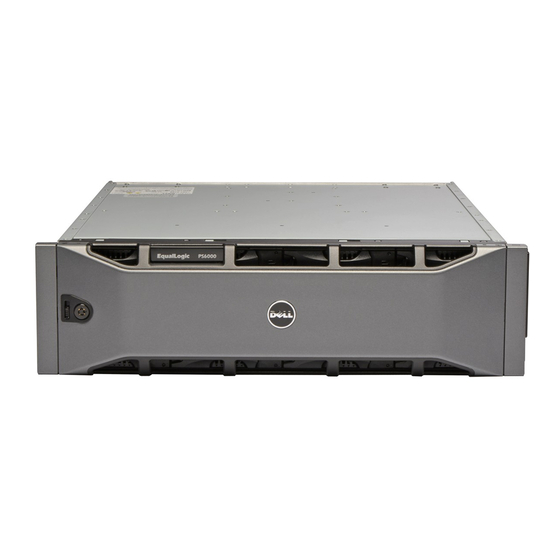Dell Equallogic PS6010xvs Manual do hardware - Página 35
Procurar online ou descarregar pdf Manual do hardware para Armazenamento Dell Equallogic PS6010xvs. Dell Equallogic PS6010xvs 50 páginas. Equallogic ps series storage products
Também para Dell Equallogic PS6010xvs: Visão geral (7 páginas)

•
Creating Access Control Records.
•
Connecting Hosts to Volumes.
•
Advanced Storage Features.
Running The Group Manager GUI
You can use the Group Manager graphical user interface (GUI) to configure the storage array(s) and perform other
group administration tasks using one of the following methods:
•
Use a Web browser through a standard web connection using HTTP (port 80).
•
Install the GUI on a local system and run it as a standalone application.
To run the Group Manager GUI on a web browser:
1.
Specify the following group IP address in a web browser window http://group_ip_address.
group_ip_address refers to the IP address that you have configured for the group.
Where
When you connect to the group, the login dialog box is displayed.
2.
Enter a group administration account name.
You can use the default grpadmin account and password you set when creating the group if no other accounts
have been set up.
Group Manager GUI Components
The Group Manager GUI enables you to manage various group components, which you access by clicking and
expanding objects in the tree structure in the far left panel:
•
Group Configuration — Modifies the group configuration and set up accounts, event notification, network
services, authentication, and SNMP.
•
Group Monitoring — Monitors iSCSI connections to the group, snapshot and replication schedules, volume
replication configurations and activity, administrative sessions and login history, and in-progress member and
volume move operations.
•
Events — Displays events in the group.
•
Storage Pools — Creates and manages pools in the group.
•
Members — Monitors and manages group members, including configuring network interfaces.
•
Volumes — Monitors and manages volumes, snapshots, replicas, and schedules.
•
Volume Collections — Creates and manages collections of volumes. Organizing multiple, related volumes into a
collection enables you to create snapshots or replicas of the volumes in a single operation or schedule.
•
Replication Partners — Monitors and manages replication partners.
Creating Volumes
To access storage in a PS Series group, you must create one or more storage pools and then allocate portions of the
storage pool(s) to volumes. Each volume is assigned a size, storage pool, and access controls. Volumes are seen on the
network as iSCSI targets. Only hosts with an iSCSI initiator and the correct access credentials can access a volume.
The group automatically generates an iSCSI target name for each volume. This is the name that iSCSI initiators use to
access the volume.
To create a volume:
1.
Click Volumes and Create volume.
The Create Volume-General Settings dialog box is displayed. You can specify information in the following fields:
–
Volume name —Unique name, up to 64 alphanumeric characters (including periods, hyphens, and colons),
used to identify the volume for administrative purposes. The volume name is displayed at the end of the
35
